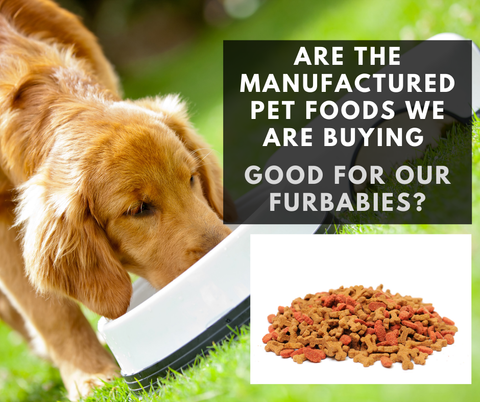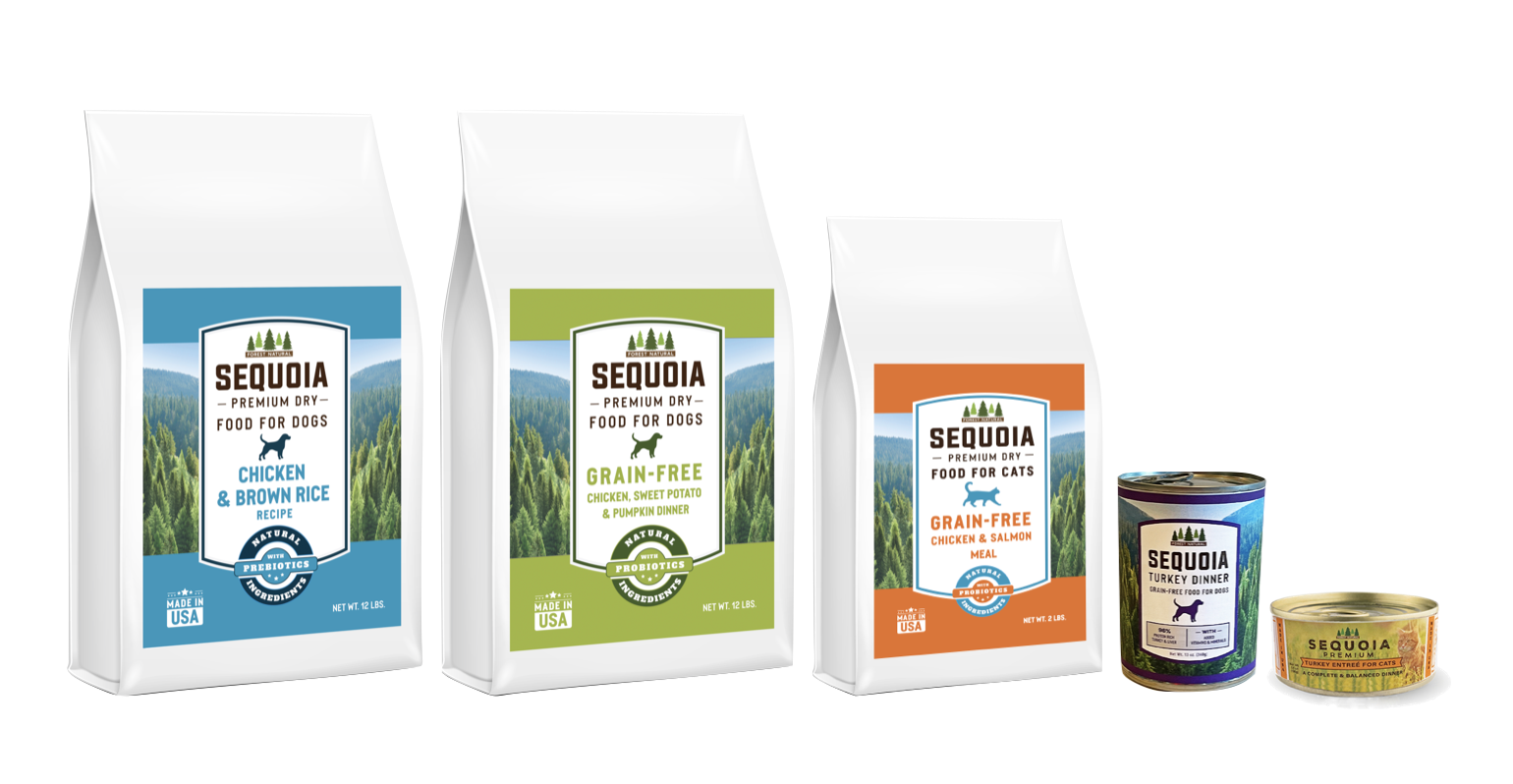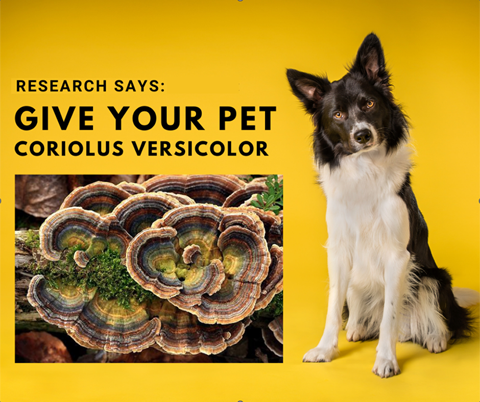Are The Manufactured Pet Foods We Are Buying Good For Our Fur Babies?
Reading Time: 7 minutes
Updated On October 30, 2020
Share This Article:
The spring of 2007's largest ever pet food recall that resulted in the poisoning and deaths of thousands of dogs and cats across North America showed many pet parents that dogs and cats should not be fed most manufactured pet foods as their main or only source of nutritional sustenance. Many have also come to this conclusion because of the dramatic clinical improvement in dogs and cats suffering from a number of chronic, debilitating, and costly health problems once they have been taken off highly processed commercial pet foods and are given naturally formulated, organic whole food diets appropriate for their species, age, physical condition, and activity level.
What's Really In Your Pet's Foods
Scientifically formulated, manufactured pet foods are packed with chemical supplements used to 'fortify', i.e. make up for deficiencies in the basic ingredients that are slaughter house and food and beverage industry waste byproducts, and other chemical additives to flavor/taste-enhance, stabilize, preserve, color and 'texturize' (appear like meat and gravy rather than a grey mush).
According to a CNN News report, such supplements that are put into processed foods for human consumption as well as in to pet foods are not subject to any FDA inspection or oversight, and the government has no records as to country of origin of these additives/supplements.
Many micronutrients are destroyed by processing, excessive exposure to heat and/or water denatures proteins, destroying essential amino acids, vitamins C, thiamine, niacin, riboflavin, and some of the essential fatty acids. Acidification of the diet can destroy acid-sensitive micronutrients like vitamin K, biotin and B-12.
Acidification
Acidification has been done for several years by pet food manufacturers to help control struvite crystal formation in the urine that becomes too alkaline when dogs and cats are fed high cereal diets. This can lead to the development of calculi/stones in the urinary tract that cause painful and even fatal urinary blockage. Such artificial alteration of the acidity/alkalinity of the animals' food can cause metabolic acidosis and kidney failure. These are common emergencies, along with urinary retention, in veterinary practice. Acidification of pet foods also resulted in an increased incidence of calcium oxalate uroliths/stones.
Not Listed On The Label
There are additional chemical contaminants not listed on the pet food label that were associated with the production, processing, and preserving of the original sources of the primary ingredients like animal fat, chicken meal and corn meal, including pesticide residues, animal drugs, ethoxyquin ( a known carcinogen) to prevent tallow from becoming rancid, and polyacrylamide used to coagulate slaughter house waste. Mercury compounds in fish products, and dioxins and PCBs in most animal byproducts are additional concerns, as is the lower nutritional value of conventionally grown crops compared to organically grown*.
To claim that manufactured pet foods are scientifically formulated and are therefore safe and provide complete nutrition for growth and health maintenance is as incorrect as contending that genetically engineered crops and foods are âsubstantially equivalent' to conventional crops and foods and are therefore as safe and as nutritious. The former claims have proven, year after year, to be patently false and misleading, as exemplified by the many animals becoming ill because of deficiencies in taurine and essential fatty acids, and from imbalances in calcium and phosphorus and essential trace minerals.
The science supporting the pet food industry is based not on veterinary nutritional science but on the animal production science of livestock feed formulation that relies on simplistic ingredient analysis and formulation as per the 'Guaranteed Analysis' on pet food labels that shows the percentage of crude protein, fat, carbohydrate, fiber and ash. The list of supplements/additives is always longer than the list of the basic ingredients such as chicken meal, meat byproduct and corn meal.
Veterinary clinical nutrition is essentially applied after the fact, once feeding trials are conducted on basic low-cost ingredient formulations and then potential and reported health problems are corrected by the inclusion of various additives/supplements. Feeding trials to determine safety and nutritional values are not cost-effective and so are not done on a regular basis but should be with every new formulation and when ingredients from different sources are used. In actuality, standardization in terms of quality can be better established for synthetic, manufactured chemical additives/supplements than for the basic food ingredients. Yet this is not without risk considering the recent recall of pet food containing toxic levels of Vitamin D that caused systemic calcinosis in cats.
Standardization of supplement/additive amounts, in terms of the quantity added to each batch of manufactured pet food cannot be established without knowing what is in the basic food ingredients, and that can vary widely according to supplier, time in storage, degree of prior processing, etc.
Plant ingredients, often contaminated with aflatoxin and other toxic molds, can be deficient in iron, zinc, selenium, magnesium, vitamin A and C, and lysine, among other essential nutrients and high in phytoestrogens, endocrine disrupting agrichemicals, dioxins, and PCBs, the latter being a serious problem because of bioaccumulation in animal-derived food ingredients.
Aside from bacterial contamination, notably with Salmonella and E. coli, animal derived ingredients can throw off supplement calculations when high in calcium, a common result of de-boning; high in contaminants like mercury, lead, cadmium, and arsenic; deficient in essential fatty acids like omega 3, but high in omega 6; and deficient in zinc, selenium and magnesium. Fewer tests of primary ingredients would be needed for known-source and inspected, humane and organically certified producers and marketers of agricultural commodities for human and animal consumption. Tests on organic produce, both vegetable and animal-derived, have shown consistently higher levels of vitamins, trace minerals and other essential nutrients compared to conventionally grown crops.
Naturally Constituted Whole Foods vs. Scientifically Concocted Manufactured Pet Foods
The difference between naturally constituted whole foods and scientifically concocted manufactured pet foods can be seen on the pet food labels with a plethora of synthetic vitamins, amino acids and trace minerals of dubious nutritive value and origin (as from China) deemed essential because of the poor quality of lowest-cost basic ingredients, and because of the destruction/denaturing of essential nutrients due to processing, storage and cooking.
Aside from the fact that major pet food companies are still selling predominantly cereal-based cat foods (e.g. combinations of corn meal, corn gluten mea, wheat, and soy flour), dog and cat foods can include the following non-nutritive additives: -Umectants like sugar/sucrose, corn syrup, sorbitol and molasses; natural coloring agents like iron oxide and caramel, and synthetic coloring agents like coal-tar derived azo-dyes such as Yellow 5, Red 40, Yellow 6, and Blue 2; flavor and palatability enhances include 'animal digest', and even MSG (monosodium glutamate). -Red 2G food coloring has been identified by the European Food Standards Authority as a carcinogen, and other coal-tar and petrochemical-derived Azo dyes used as food (and beverage) coloring agents are now being re-evaluated. -Touting chicken byproduct meal as a 'source of chondriotin and glucosamine' in reality means that much of this ingredient is probably of low protein value because it contains a lot of cartilage and bone from the remains of ground up chicken parts not considered fit for human consumption.
Vets For Pet Food Manufacturers
Both dry and canned dog and cat foods contain ingredients that can cause food-allergy or hypersensitivity, and may also lack essential nutrients that lead to various skin and other health problems. But because most veterinarians believe in what the pet food manufacturers claim, (and recent graduates are no exception when one looks at the funds provided to State and private veterinary colleges by the pet food industry), they rarely suggest changing their sick animals' diet. Instead they practice iatrogenic medicine, first by endorsing the continued feeding of potentially harmful diets, then by prescribing potentially harmful drugs and costly special prescription diets that are all too often useless and highly unpalatable.
Following the initiative of drug companies, major pet food companies now also endow Chairs and fund departments, lectureships and student fellowships and prizes at every veterinary college in the US, and around the world in countries where profits are to be made. It is no coincidence that one of the biggest American pet food manufacturers in the U.S. is now selling Pet Health Insurance policies.
As a more informed consumer populace says 'no' to junk/fast/convenience foods, so the days are numbered for the other agribusiness food and beverage industry subsidiary, namely the main-stream commercial pet food manufacturer, unless it chooses to meet the rising public demand for safe and nutritious food for all. And that, surely, would be an ethically enlightened business decision, since continued resistance to change, denial, lack of accountability, and defense of the status quo are ultimately counterproductive and self-defeating regardless of the $15 billion annual income enjoyed by U.S. pet food manufacturers. But public trust will be hard to regain after the debacle of the largest pet food recall ever in the U.S. in the spring of 2007 of some 60 million containers bearing scores of different manufacturer and supplier labels, including all the big brand names, that left an estimated 8,500 dogs and cats dead, and harmed hundreds of thousands of others.
The Natural Foods
There is a new generation of commercial cat and dog foods, from raw to freeze-dried, canned to dry, that contain organically certified, whole food ingredients* properly formulated and balanced, (i.e. not loaded with cereal and meat industry byproducts), that are now appearing on grocery shelves, online, and being marketed by local and national supply networks.
This trend goes hand in hand with increasing consumer demand for organically produced, minimally processed foods as more health and environmentally conscious shoppers vote with their dollars and sense: And with veterinarians recognizing and the harmful consequences of most manufactured pet foods, and treating their animal patients accordingly.
You Might Also Be Interested In:




